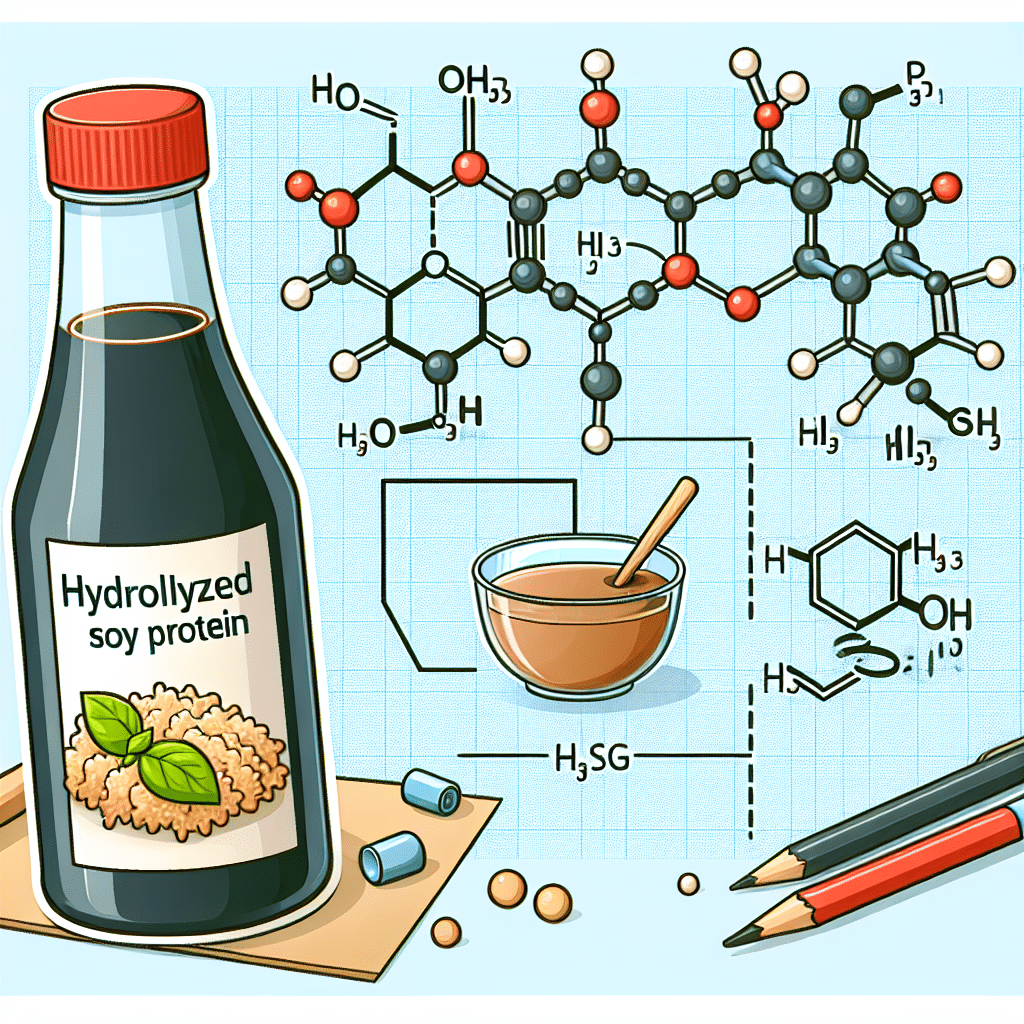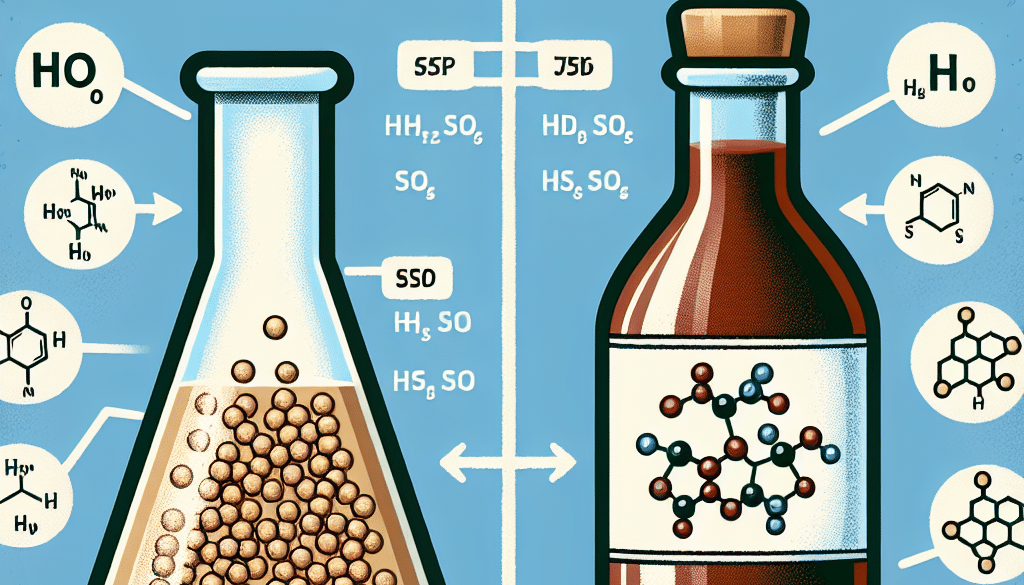Is Hydrolyzed Soy Protein Soy Sauce?
-
Table of Contents
- Hydrolyzed Soy Protein and Soy Sauce: Understanding the Differences
- What is Hydrolyzed Soy Protein?
- What is Soy Sauce?
- Comparing Hydrolyzed Soy Protein and Soy Sauce
- Health Considerations and Dietary Restrictions
- Applications in the Food Industry
- Environmental and Ethical Considerations
- Conclusion: Key Takeaways
- Discover ETprotein’s High-Quality Protein Products
Hydrolyzed Soy Protein and Soy Sauce: Understanding the Differences

When it comes to soy-based products, there is often confusion between various ingredients and condiments that are derived from this versatile legume. Two such products are hydrolyzed soy protein and soy sauce, which, despite their similar origins, serve different purposes in the culinary world. This article aims to clarify whether hydrolyzed soy protein is the same as soy sauce and to provide valuable insights into their distinct characteristics.
What is Hydrolyzed Soy Protein?
Hydrolyzed soy protein is a product obtained from the soybean. It is created by breaking down soy protein into smaller peptide chains through a process called hydrolysis. This involves treating the soy protein with enzymes or acids, which effectively reduces the protein molecules into a form that is more easily digestible and soluble. Hydrolyzed soy protein is commonly used as a flavor enhancer and as a source of protein in various food products.
What is Soy Sauce?
Soy sauce, on the other hand, is a traditional Asian condiment made from a fermented paste of soybeans, roasted grain, brine, and Aspergillus oryzae or Aspergillus sojae molds. The mixture is left to ferment for a period ranging from a few months to several years. The resulting liquid, which is pressed from the fermented paste, is the soy sauce that is widely used to add a savory umami flavor to dishes.
Comparing Hydrolyzed Soy Protein and Soy Sauce
While both hydrolyzed soy protein and soy sauce originate from soybeans, they are not the same product. Here are some key differences:
- Production Process: Hydrolyzed soy protein is made through hydrolysis, while soy sauce is produced by fermentation.
- Flavor Profile: Hydrolyzed soy protein is primarily used as a flavor enhancer with a salty taste, whereas soy sauce has a complex, rich flavor that includes sweet, sour, bitter, and umami notes.
- Usage: Hydrolyzed soy protein is often found in processed foods, meat products, and as a protein supplement. Soy sauce is used as a condiment and seasoning in cooking.
- Nutritional Content: Soy sauce contains fewer proteins compared to hydrolyzed soy protein, which is mainly used for its high protein content.
Health Considerations and Dietary Restrictions
Both hydrolyzed soy protein and soy sauce contain allergens and are not suitable for individuals with soy allergies. Additionally, they both contain naturally occurring glutamates, which can be a concern for those sensitive to MSG. However, it’s important to note that hydrolyzed soy protein may be used in products that are labeled as containing “natural flavors,” making it harder for consumers to identify.
Applications in the Food Industry
Hydrolyzed soy protein and soy sauce are used in various applications within the food industry:
- Hydrolyzed Soy Protein: It is often used in meat products to enhance flavor and retain moisture, in protein bars and shakes, and as a nutrient supplement in health foods.
- Soy Sauce: It is a staple in Asian cuisine, used in marinades, dipping sauces, and as a seasoning for a wide range of dishes.
Environmental and Ethical Considerations
The production of soy has been linked to deforestation and other environmental concerns. Consumers interested in sustainability may want to consider the source of the soy products they consume, including hydrolyzed soy protein and soy sauce. Additionally, the fermentation process of soy sauce often involves more traditional methods and may be seen as more natural compared to the chemical process of hydrolyzing soy protein.
Conclusion: Key Takeaways
In conclusion, hydrolyzed soy protein and soy sauce are distinct products with different production processes, flavor profiles, and uses in the food industry. While they both come from soybeans, they are not interchangeable. Hydrolyzed soy protein is a highly digestible protein source used mainly for its nutritional properties, whereas soy sauce is a complex condiment used for its unique flavor. Understanding these differences is crucial for consumers, especially those with dietary restrictions or concerns about food additives.
Discover ETprotein’s High-Quality Protein Products
If you’re looking for premium protein products, ETprotein offers a range of organic bulk vegan proteins that cater to various industries. Their products, including hydrolyzed soy protein, are characterized by a neutral taste, non-GMO, and allergen-free attributes. With a commitment to quality and customer satisfaction, ETprotein is your go-to source for all your protein needs.
About ETprotein:
ETprotein, a reputable protein and L-(+)-Ergothioneine (EGT) Chinese factory manufacturer and supplier, is renowned for producing, stocking, exporting, and delivering the highest quality organic bulk vegan proteins and L-(+)-Ergothioneine. They include Organic rice protein, clear rice protein, pea protein, clear pea protein, watermelon seed protein, pumpkin seed protein, sunflower seed protein, mung bean protein, peanut protein, and L-(+)-Ergothioneine EGT Pharmaceutical grade, L-(+)-Ergothioneine EGT food grade, L-(+)-Ergothioneine EGT cosmetic grade, L-(+)-Ergothioneine EGT reference grade and L-(+)-Ergothioneine EGT standard. Their offerings, characterized by a neutral taste, non-GMO, allergen-free attributes, with L-(+)-Ergothioneine purity over 98%, 99%, cater to a diverse range of industries. They serve nutraceutical, pharmaceutical, cosmeceutical, veterinary, as well as food and beverage finished product distributors, traders, and manufacturers across Europe, USA, Canada, Australia, Thailand, Japan, Korea, Brazil, and Chile, among others.
ETprotein specialization includes exporting and delivering tailor-made protein powder and finished nutritional supplements. Their extensive product range covers sectors like Food and Beverage, Sports Nutrition, Weight Management, Dietary Supplements, Health and Wellness Products, and Infant Formula, ensuring comprehensive solutions to meet all your protein needs.
As a trusted company by leading global food and beverage brands and Fortune 500 companies, ETprotein reinforces China’s reputation in the global arena. For more information or to sample their products, please contact them and email sales(at)ETprotein.com today.












